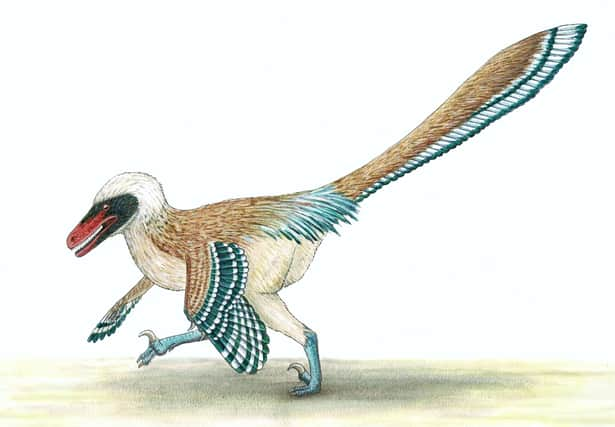Portsmouth teams discover fossils of bird-like dinosaur that ripped its prey apart with claws


The new animal has been named vectiraptor greeni after local collector Mick Green, who discovered its bones after they became washed from the rocks on the Isle of Wight’s south coast.
The creature was a more heavily-built relative of the velociraptor predator which featured in the Jurassic Park movie and belonged to a group of dinosaurs called dromaeosaurs, or raptors.
Advertisement
Hide AdAdvertisement
Hide AdThe find of the first large raptor in the UK has been confirmed by scientists from the universities of Bath and Portsmouth.
Dr Nick Longridch, from the University of Bath, said: ‘This was a large and very heavily constructed animal.
‘The bones are thick-walled and massive. It clearly didn’t hunt small prey, but animals as large or larger than itself.”
The vectiraptor was about the size of a wolf, about 10ft long, and would have used its huge slashing talons on its feet to kill its prey and its finely serrated teeth to bite off pieces.
Advertisement
Hide AdAdvertisement
Hide AdThe dinosaur dates back 125 million years ago to the early cretaceous period but the fossils lay buried until 2004 when they exposed when storms and waves eroded away the rocks they were hidden in.
Dr Longrich added: ‘It’s a tantalising hint at the diversity of dinosaurs in England at this time.
‘This is the first time a large raptor has been found in the UK.
‘There’s an extraordinary diversity of dinosaurs known in England in the cretaceous, and even after more than a century of study, we continue to find new species.’
Advertisement
Hide AdAdvertisement
Hide AdCo-author Professor Dave Martill of the University of Portsmouth said raptors closely related to Velociraptor have also been found in Mongolia, suggesting that England may have lain along an important dispersal route for dinosaurs.
Professor Martill said, given the similarity between North American and Mongolian dinosaur faunas in the Early Cretaceous, it was only a matter of time before someone discovered a raptor dinosaur in England.
A spokesman for the University of Portsmouth said: ‘A remarkable number of dinosaur species originate from this small island off southern England. Ancient England was something of a crossroads for dinosaurs. At the time the continents were closer together, with some connected by land bridges. Dinosaurs likely wandered in from north America and Asia, or perhaps swam from Africa. Europe was a sort of crossroads linking the continents.’
Megan Jacobs, a collaborator on the project from the University of Portsmouth, added: ‘This dinosaur is incredibly exciting, adding to the huge diversity of dinosaurs here on the Isle of Wight, and helping to build a bigger picture of the Early Cretaceous world.
Advertisement
Hide AdAdvertisement
Hide Ad‘This little dinosaur also serves as an excellent example of the importance of amateur fossil collectors, and how working with them can produce important scientific research, which would otherwise not be possible.’
A message from the Editor, Mark Waldron
You can subscribe here for unlimited access to our online coverage, including Pompey, with 70 per cent fewer adverts for less than 20p a day.
Comment Guidelines
National World encourages reader discussion on our stories. User feedback, insights and back-and-forth exchanges add a rich layer of context to reporting. Please review our Community Guidelines before commenting.
